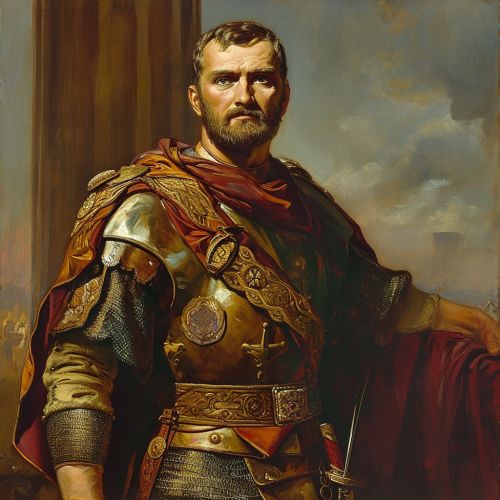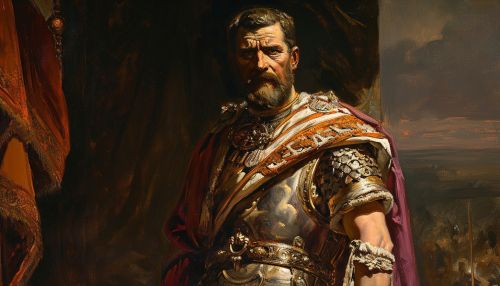Theodosius I
Early Life
Theodosius I, also known as Theodosius the Great, was born on January 11, 347, in the small town of Cauca, in the province of Gallaecia in the northwest of the Roman Empire. His father, also named Theodosius, was a high-ranking military officer under the Emperor Valentinian I, and his mother's name was Thermantia.
Military Career
Theodosius followed in his father's footsteps and joined the Roman military at a young age. He quickly rose through the ranks due to his exceptional military skills and strategic acumen. His first significant military achievement was in 368 when he led a successful campaign against the Sarmatians, a confederation of nomadic tribes in Eastern Europe. This victory earned him the respect of his peers and superiors, setting the stage for his future military successes.


Ascension to the Throne
Following the death of Emperor Valens in the Battle of Adrianople in 378, Theodosius was appointed as the new Emperor of the Eastern Roman Empire by Gratian, the Western Roman Emperor. Theodosius' primary task was to restore stability and order in the East following the disastrous defeat at Adrianople. His ascension marked the beginning of his reign, which would last until his death in 395.
Reign as Emperor
Theodosius' reign was marked by significant military, religious, and administrative reforms. He is best known for making Christianity the official state religion of the Roman Empire, a decision that had far-reaching implications for the future of Europe and Christianity as a whole.
Military Reforms
One of the first actions Theodosius took as Emperor was to rebuild the Roman army, which had been severely weakened by the defeat at Adrianople. He incorporated Germanic warriors into the Roman military, a move that was controversial but necessary given the circumstances. These reforms helped restore the military strength of the Empire and allowed Theodosius to successfully defend the Empire against various threats.
Religious Reforms
Theodosius is perhaps best known for his religious reforms. In 380, he issued the Edict of Thessalonica, which made Nicene Christianity the official state religion of the Roman Empire. This marked a significant turning point in the history of Christianity and the Roman Empire. Theodosius also took measures to suppress paganism and Arianism, leading to the end of classical paganism in the Empire.
Administrative Reforms
Theodosius also implemented significant administrative reforms during his reign. He restructured the imperial court, reduced the power of the military, and took steps to curb corruption. These reforms helped stabilize the Empire and set the stage for the Byzantine Empire that would follow.
Death and Legacy
Theodosius I died on January 17, 395, in Milan. His death marked the end of the last time the Roman Empire would be politically unified. His sons, Arcadius and Honorius, succeeded him as the Emperors of the Eastern and Western Roman Empire, respectively.
Theodosius' legacy is complex and multifaceted. He is remembered as a strong military leader, a devout Christian, and a reformer. His decision to make Christianity the state religion of the Roman Empire had a profound impact on the future of Europe and the Christian faith. Despite the controversies and challenges of his reign, Theodosius left a lasting mark on the Roman Empire and the world.
